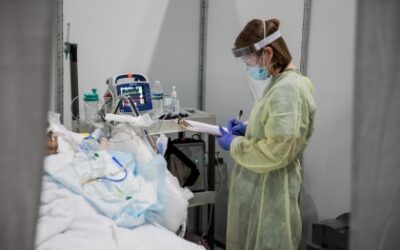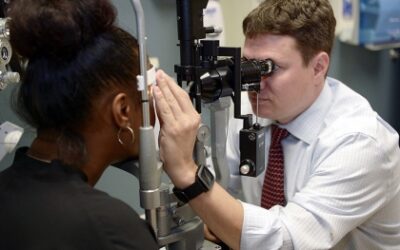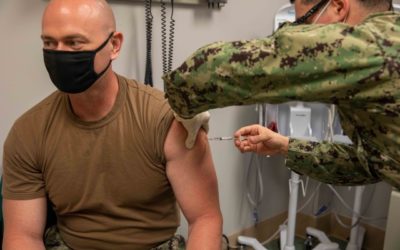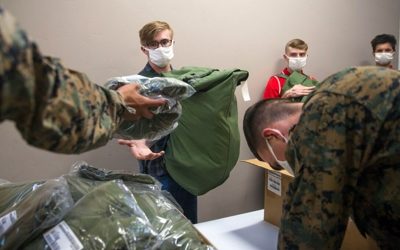From the earliest days of the pandemic, it was evident that people with certain medical conditions faced an increased risk of severe COVID-19.
Treatment Quandary Continues for Non-metastatic Castration-resistant PCa
While most men with non-metastatic prostate cancer respond to androgen-deprivation therapy initially, many later experience rising prostate-specific antigen levels that indicate they have developed castration resistance.
Adverse Events Predict Cognitive Decline After Brain Stimulation
In a small subset of Parkinson’s disease patients, deep brain stimulation is linked to statistically and clinically significant cognitive declines.
Gout Associated With Slightly Decreased Risk of Glaucoma in Veterans
How does a history of gout or arthritis due to hyperuricemia affect the development of the ocular neurodegenerative condition glaucoma?
Brain Stimulation Improves Memory in Veterans with Early Alzheimer’s Disease
Transcranial magnetic stimulation, or TMS, is a technique that uses strong magnetic pulses to stimulate regions of the brain, producing electric currents that may affect neuron activity.
Expanded Role for MTFs Could Improve Obstetric Care in Underserved U.S. Areas
If military treatment facilities offered emergency cesarean delivery and other high-quality obstetric care to civilians in underserved areas of the United States, according to a new study, it would not only significantly improve the health of expectant mothers and their babies but also potentially improve military readiness.
Dry Eye Worse in Veterans With GWI
Veterans with Gulf War illness (GWI) have more severe dry eye (DE) symptoms, including neuropathic eye pain questionnaire scores, when compared to those who served during the Gulf War but did not meet criteria for GWI.
VA OIG Questions VA’s Data on Ability to Provide Specialty Healthcare
Part of the VA MISSION Act of 2018 required VA to conduct a nationwide audit of its healthcare system’s capacity, identify gaps in care and make recommendations for modernizing or realigning VA facilities to fill those gaps.
Conference Highlights Concerns About Increased CV Risk Factors in Veterans
New research is adding to the evidence that veterans are at increased risk for cardiometabolic conditions and poor cardiovascular outcomes.
VA Study: TNF Inhibitors Have Potential Long-Term Effect on Dementia Risk
Alzheimer’s disease (AD) is a global health problem for which there are no disease-modifying therapies.
Who Are Homeless Veterans and What Do They Really Need?
This city is home to the largest VAMC in the nation, as well the single largest population of U.S. veterans. Yet about 4,000 of the vets who call Los Angeles home actually have no home.
BCG Vaccine Doesn’t Protect Against COVID-19 Infection, Severity
At an earlier point in the COVID-19 pandemic, hopes were raised that the BCG (Bacillus Calmette-Guérin) vaccine, which stimulates innate immunity, could provide protection against SARS-CoV-2.
VA Study Questions Value of Remdesivir in Hospitalized COVID-19 Patients
Last October, the Food and Drug Administration approved remdesivir, marketed as Veklury, for use in adults and children 12 and older who weight at least 40 kg for the treatment of COVID-19 requiring hospitalization.
TAPS Can Be the Start of Something Good for Veterans with Essential Tremor
Veterans are used to the sound of Taps marking an end. For a growing number, TAPS may indicate the beginning of a road to recovery of independence.
Healthcare Quality Assurance Programs Again Found Lacking by OIG Report
The quality, safety and value (QSV) programs in some VA facilities continue to fall short, according to a new VA Inspector General report.
Somatic Symptom Disorder Ups PTSD Risk
In somatic symptom disorder, patients develop too much focus on physical symptoms, such as pain, weakness or shortness of breath, which causes them significant distress and often creates problems for normal function, according to the American Psychiatric Association.
LAIs Improve VHA Schizophrenia Medication Adherence
Ensuring high rates of medication adherence is one of the greatest challenges in treating schizophrenia patients at the VA and elsewhere.
Strebel Helps Create Tool to Identify VA COVID-19 Patients Most at Risk
Is it possible to create an algorithm that not only accurately predicts which COVID-19 patients will be hardest hit by the virus but will also be accepted and trusted by clinicians?
SGLT2 Inhibitors Found to Be Superior to Sulfonyureas in Veterans’ T2D
Sodium-glucose cotransporter 2 (SGLT2) inhibitors, a relatively new class of antihyperglycemics, have become an important tool in the treatment of Type 2 diabetes—a disease that affects an estimated 25% of VA patients.
Defense Health Agency’s COVID-19 Vaccine Research Sparks Controversy
Research on rare adverse effects from COVID-19 vaccines has thrust the military into the center of the rancorous controversy about vaccination safety, causing some Congress members to question whether immunization against novel coronavirus should be required by the nation’s uniformed services.
Blood Screening Tool Increases Alzheimer’s Trial’s Diversity
Mexican American patients often aren’t participants in Alzheimer’s disease (AD) clinical research, according to a new study that suggests more efficient screening tools could change that.
Military Survey Shows Preferences for HIV Pre-Exposure Prophylaxis Delivery
Use of pre-exposure prophylaxis to prevent human immunodeficiency virus transmission remains relatively low for U.S. military servicemembers. New research suggests, however, that better understanding their treatment preferences could increase uptake.
FDA Grants Accelerated Approval for Controversial Novel Alzheimer’s Medication
Aducanumab, the novel Alzheimer’s drug that recently gained accelerated approval from the Food and Drug Administration is expected to cost about $56,000 a year.
Promising Treatments Boost Positive Extended Results in HCC
Without treatment, even patients diagnosed with early stage hepatocellular carcinoma (HCC) have a median survival of just over a year. Patients with advanced stage disease at diagnosis will likely see just one change of season.
How Women Veterans’ Breast Cancer Compares to Male Version
Less than 1% of breast cancer occurs in men, although it continues to rise.
Many Female VA Patients Appear to Have Undiagnosed OSA
Too many women veterans remained undiagnosed with sleep apnea, even if they were at high risk of adverse outcomes, according to a new study.
Rates of Insomnia Disorders in Younger Veterans ‘Alarming’
Sleep researchers at the VA have sent out a distress signal about the high rates of insomnia disorder in younger veterans.
Navy Study Shows Marine Recruits Not Immune to Reinfection With COVID-19
Previous infection with COVID-19 provided some but not complete protection against reinfection in young Marine recruits, according to a new study.
Too Many Veterans With HIV Prescribed Inappropriate BP Medications
HIV patients on anti-retroviral therapy are at increased risk for cardiovascular events, heightening the importance of preventive care. Now, new research has found that selection of blood pressure medication is critically important for this group and can have a significant effect on risk of cardiovascular events or even death.
Study Sought to Characterize Ocular Pain Symptoms
How common is ocular pain in patients with and without a history of refractive surgery, and what are its characteristics?






